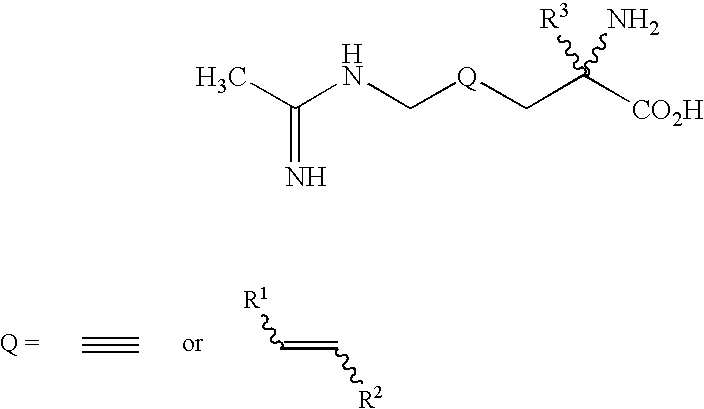2-amino-2-alkyl-4 hexenoic and hexynoic acid derivatives useful as nitric oxide synthase inhibitors
a technology of hexenoic acid and hexynoic acid, which is applied in the direction of application, peptide/protein ingredients, drug compositions, etc., can solve the problem of imposing conformational rigidity with one or more carbon-carbon double bonds, and is not a favorable approach to impart selectivity of nos inhibitors
- Summary
- Abstract
- Description
- Claims
- Application Information
AI Technical Summary
Benefits of technology
Problems solved by technology
Method used
Image
Examples
example 1a
##STR26##
DL-Alanine ethyl ester hydrochloride (5 g, 32.5 mmol) was suspended in toluene (50 mL). Triethyl amine (4.5 mL, 32.5 mmol) was added followed by phthalic anhydride (4.8 g, 32.5 mL). The reaction flask was outfitted with a Dean-Stark trap and reflux condenser and the mixture was heated at reflux overnight.
Approximately 10 mL of toluene / water was collected. The reaction mixture was cooled to room temperature and diluted with aqueous NH.sub.4 Cl and EtOAc. The layers were separated and the aqueous layer was extracted with EtOAc (3.times.). The ethyl acetate extract was washed with brine, dried over MgSO.sub.4, filtered and concentrated in vacuo to give the title phthalyl-protected amino ester as a white crystalline solid in near quantitative yield.
.sup.1 H NMR (400 MHz, CDCl.sub.3, .delta. ppm): 1.2 (t, 3H), 1.6 (d, 3H), 4.2 (m, 2H), 4.9 (q, 1H), 7.7 (m, 2H), 7.9 (m, 2H)
example 1b
##STR27##
Potassium phthalimide (18.5 g, 0.1 mol) was added to a 250 mL round bottomed flask containing 1,4-butene dichloride (25 g, 0.2 mol). The reaction mixture was heated to 150.degree. C. for 1.5 h. The mixture was cooled to room temperature and was partitioned between brine and Et.sub.2 O. The organic layer was dried with MgSO.sub.4, filtered and concentrated in vacuo. The residue was recrystallized from hot ethanol to give the title 1-chloro-4-phthalimidobutene (8.9 g, 39%) as orange crystals.
HRMS calcd. For C.sub.12 H.sub.10 ClNO.sub.2 : m / z=236.0478 [M+H]. Found: 236.0449 .sup.1 H NMR (300 MHz, CDCl.sub.3, .delta. ppm): 4.1 (d, 2H), 4.3 (d, 2H), 5.9 (m, 2H), 7.7 (m, 2H), 7.9 (m, 2H)
example 1c
##STR28##
A sample of the product of Example 1b (2.3 g, 9.8 mmol) was dissolved in acetone (50 mL). NaI (3.2 g, 21 mmol) was added and the mixture was refluxed overnight. After cooling to room temperature, Et.sub.2 O was added and the mixture was washed sequentially with sodium thiosulfate and brine. The organic layer was dried with MgSO.sub.4, filtered and concentrated in vacuo to give the title iodide (2.8 g, 87.5%) as a light yellow solid that was used without further purification.
.sup.1 H NMR (400 MHz, CDCl.sub.3, .delta. ppm): 3.8 (d, 2H), 4.2 (d, 2H), 5.7 (m, 1H), 6.0 (m, 1H), 7.7 (m, 2H), 7.9 (m, 2H) Mass (M+1)=328
PUM
| Property | Measurement | Unit |
|---|---|---|
| temperature | aaaaa | aaaaa |
| pH | aaaaa | aaaaa |
| pH | aaaaa | aaaaa |
Abstract
Description
Claims
Application Information
 Login to View More
Login to View More - R&D
- Intellectual Property
- Life Sciences
- Materials
- Tech Scout
- Unparalleled Data Quality
- Higher Quality Content
- 60% Fewer Hallucinations
Browse by: Latest US Patents, China's latest patents, Technical Efficacy Thesaurus, Application Domain, Technology Topic, Popular Technical Reports.
© 2025 PatSnap. All rights reserved.Legal|Privacy policy|Modern Slavery Act Transparency Statement|Sitemap|About US| Contact US: help@patsnap.com



